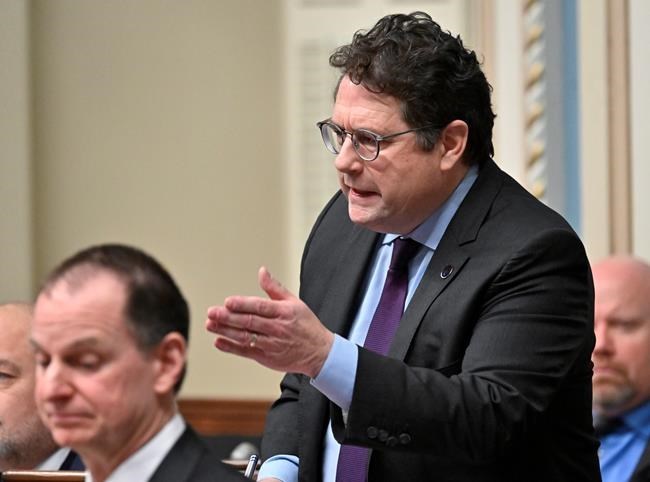
Quebec Education Minister Bernard Drainville responds to the Opposition during question period at the legislature in Quebec City, Wednesday, March 29, 2023. Muslim groups are speaking out against the Quebec government's intention to ban prayer spaces in public schools, saying they will monitor how the Education Department enforces its new rules. THE CANADIAN PRESS/Jacques Boissinot
April 11, 2023 - 1:00 AM
MONTREAL - Muslim groups are speaking out against the Quebec government's intention to ban prayer spaces in public schools, saying they will monitor how the Education Department enforces its new rules.
In response to reports that at least two Montreal-area schools had reserved spaces for Muslim students to pray, Education Minister Bernard Drainville promised last week to prohibit schools from doing so. The minister, however, said he wouldn't ban prayer altogether; students who wanted to pray should do so "discreetly'' and "silently," he told reporters.
The National Council of Canadian Muslims said Monday it would keep tabs on how the government enforced the ban on prayer spaces, adding that it would "take action" if the rights of students were violated.
"We haven't actually seen how that is going to tangibly impact people," Stephen Brown, chief executive officer of the council, said in an interview. "So (if) these directives would in fact constitute in practice a limitation on people's fundamental rights, then we would do something, we would take action."
The Education Department did not respond on Monday to a request asking whether Drainville's directive had been implemented.
Drainville's position hardened over a 24-hour period last week. His first response to the reports of school prayer spaces was to announce that schools could not privilege one religion over another and that they had to ensure the spaces respected gender equality. But he quickly changed his mind after the Parti Québécois called for stronger measures, suggesting Drainville's original conciliatory stance would encourage more schools to open up prayer rooms.
Drainville is known for presenting a so-called values charter when he was in government with the PQ in 2013. The charter called for people who wear religious symbols to be prohibited from working in public institutions. The charter was a precursor to the Coalition Avenir Québec's secularism law — Bill 21 — which was passed in 2019 and prohibits many public servants, including teachers, from wearing religious symbols at work. The minister joined the CAQ ahead of the 2022 election.
Civil rights lawyer Julius Grey said Quebec schools — regardless of Bill 21 — have no obligation to open spaces dedicated to prayer. The government could be in legal trouble, however, if it prevents students from praying altogether.
"What would be totally contrary to the Charter — and I think will get struck down — is a prohibition on individuals praying in schools," Grey said in an interview Monday. "I don't think they'll do that; I think that would be asking for a challenge."
Drainville's decision last week was denounced by a group of Muslim organizations and mosques — Table de concertation des organismes musulmans — which said the minister should have met with community leaders before prohibiting school prayer spaces.
Montreal Imam Hassan Guillet described the situation as a "tempest in teacup," saying media organizations and politicians had suggested there was something nefarious about Muslim students praying at school. In Islam, people pray five times a day and during Ramadan, there's an uptick in people who pray, he said. While people are fasting — which is required during Ramadan from dawn to sunset — some people opt to pray during those intervals, he added.
"My message to the Quebec government is to be practical, to respect citizens … all citizens, regardless of their religion or their faith or their origin; the government is the government of everybody," Guillet said in an interview Monday. "Secularism is not a carte blanche to erase religion or religious practice."
This report by The Canadian Press was first published April 11, 2023.
News from © The Canadian Press, 2023